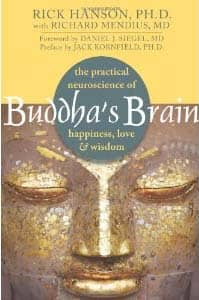Conclusion
The intertwining of mind and brain, information and matter, means that we need psychology to understand the brain . . . and neurology to understand the mind. And both are illuminated by centuries of practical experience in the world's contemplative traditions.
The intersection and integration of these three -- psychology, neurology, and contemplation -- is the heartwood of personal well-being and spiritual growth. The movement of Buddhism into the West has created an historically unprecedented opportunity for the dharma to inform science and vice versa, for the benefit of all beings.
| Key Features and Functions of Your Brain |
| Shaped by evolution; the main genetic differences between humans and chimpanzees focus on the brain, particularly its social, emotional, linguistic, and conceptual abilities |
| 3 pounds, 1.1 trillion cells, including 100 billion "gray matter" neurons |
| Always "on" -- 2% of the body's weight uses about 25% of its oxygen |
| Average neuron has about 1000 connections (synapses), 100 trillion in all |
| Synapses firing 1 to 100 times a second |
| Regions linked by brainwaves synchronized within a few milliseconds |
| Extremely interconnected network full of circular loops |
| Number of possible brain states: 1 followed by a million zeros |
| An organ that learns from experiences through lifelong changes in its structure |
| The most complex object known in the universe |

For further reading, see Hanson and Mendius' Buddha's Brain: the Practical Neuroscience of Happiness, Love and Wisdom, "Meditation on Demand" (Scientific American), and Wise Brain.
* * * *
Reprinted with permission from Inquiring Mind, ©2007 by Rick Hanson, Ph.D. and Rick Mendius, M.D.
Rick Hanson, Ph.D. is a clinical psychologist, author, and teacher with a great interest in the intersection of psychology, neurology, and Buddhism. He has written and taught extensively about the essential inner skills of personal well-being, psychological growth, and contemplative practice, as well as about relationships, family life, and raising children. He is the author of Mother Nurture: A Mother's Guide to Health in Body, Mind, and Intimate Relationships and his latest book is Buddha's Brain: The Practical Neuroscience of Happiness, Love, and Wisdom (with Rick Mendius, M.D.). He and Rick Mendius have also created the audio program, Meditations to Change Your Brain.
Rick Mendius, M.D. is a neurologist, author, and teacher. He trained at UCLA as an epileptologist under Jerome Engel and as a neurobehaviorist under Frank Benson and Jeff Cummings. He has been on the teaching faculty of UCLA, Oregon Health Sciences University, and Stanford University. His meditation practice began in the 1980s with Shinzen Young in Los Angeles, and continues at Spirit Rock with Jack Kornfield, Phillip Moffitt, Ajahn Amaro, and Ajahn Sumedho.




